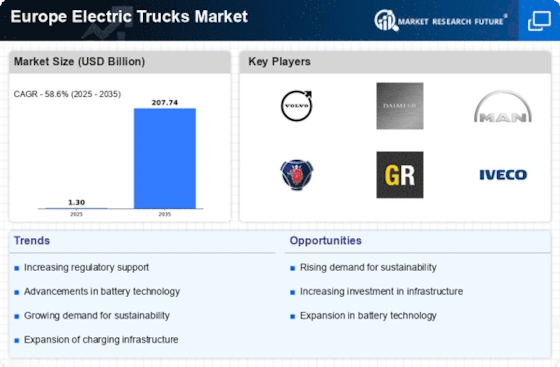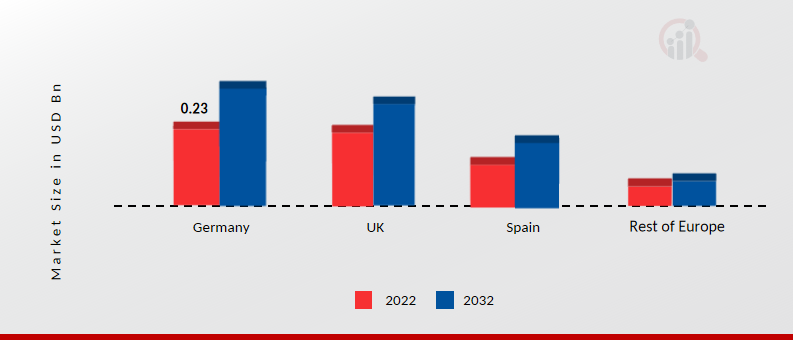Rising Fuel Prices
The Global Europe Electric Trucks Market Industry is also driven by the increasing cost of fossil fuels. As fuel prices continue to rise, logistics companies are seeking more cost-effective alternatives, leading to a growing interest in electric trucks. Electric vehicles offer lower operational costs due to reduced fuel expenses and maintenance requirements. This shift towards electric trucks is particularly evident in urban areas where fuel prices are higher. Consequently, the market is expected to expand, with a compound annual growth rate of 12.35% projected from 2025 to 2035, as companies aim to mitigate rising fuel costs.
Environmental Awareness
Growing environmental consciousness among consumers and businesses is a significant driver for the Global Europe Electric Trucks Market Industry. As awareness of climate change and pollution increases, companies are under pressure to adopt sustainable practices. Electric trucks, which produce zero tailpipe emissions, are seen as a viable solution to reduce the carbon footprint of logistics operations. This shift towards sustainability is prompting many companies to transition their fleets to electric vehicles. As a result, the market is likely to experience robust growth, aligning with the broader trend of environmental responsibility in the transportation sector.
Market Growth Projections
The Global Europe Electric Trucks Market Industry is projected to experience substantial growth over the coming years. With a market value of 12.5 USD Billion in 2024, it is expected to reach 45 USD Billion by 2035. This growth trajectory reflects a compound annual growth rate of 12.35% from 2025 to 2035. Such projections underscore the increasing adoption of electric trucks across various sectors, driven by technological advancements, regulatory support, and changing consumer preferences. The market's expansion is indicative of a broader shift towards sustainable transportation solutions in Europe.
Technological Advancements
Technological innovations play a crucial role in the Global Europe Electric Trucks Market Industry. The development of advanced battery technologies, such as solid-state batteries, is enhancing the efficiency and range of electric trucks. These advancements not only improve performance but also reduce charging times, making electric trucks more appealing to logistics companies. Furthermore, the integration of smart technologies, including telematics and autonomous driving features, is likely to attract more businesses to adopt electric trucks. As a result, the market is anticipated to grow significantly, with projections indicating a value of 45 USD Billion by 2035.
Urbanization and E-commerce Growth
The rapid urbanization and expansion of e-commerce are pivotal factors influencing the Global Europe Electric Trucks Market Industry. As cities grow and online shopping becomes more prevalent, the demand for efficient last-mile delivery solutions increases. Electric trucks are particularly suited for urban environments due to their lower emissions and noise levels. This trend is driving logistics companies to invest in electric fleets to meet the rising demand for sustainable delivery options. The market is poised for growth, with projections indicating a substantial increase in value as urban areas continue to expand and e-commerce thrives.
Government Regulations and Incentives
The Global Europe Electric Trucks Market Industry is significantly influenced by stringent government regulations aimed at reducing carbon emissions. Various European nations have implemented policies that promote the adoption of electric vehicles, including electric trucks. For instance, the European Union has set ambitious targets for reducing greenhouse gas emissions, which encourages manufacturers to invest in electric truck technology. Additionally, financial incentives such as subsidies and tax breaks for electric vehicle purchases further stimulate market growth. These regulatory frameworks are expected to enhance the market's value, projected to reach 12.5 USD Billion in 2024.





